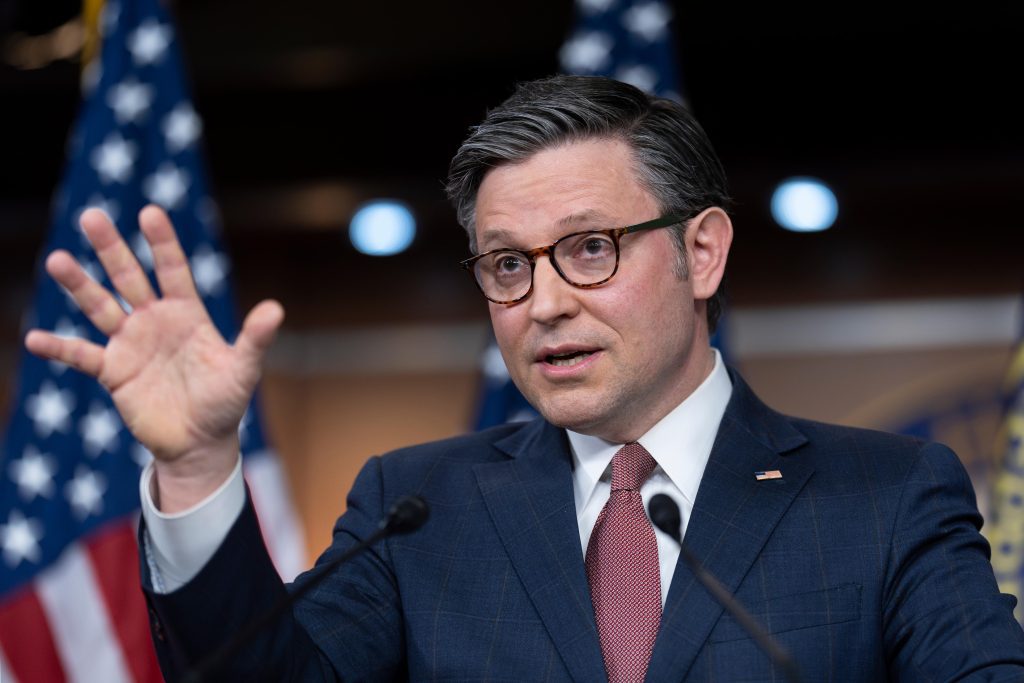By KEVIN FREKING (Associated Press)
WASHINGTON (AP) — On Friday, just a few hours before funding for some important federal agencies was about to expire, the House finally approved a $1.2 trillion package of spending bills. This overdue action occurred nearly six months into the budget year and will move any threat of a government shutdown to the fall.
The bill was passed with a vote of 286-134 and will now go to the Senate, where leaders hope for a final vote later Friday. More than 70% of the money would go to defense.
Speaker Mike Johnson, R-La., brought the bill under a simplified process that needed two-thirds support for approval.
The Senate's action could take time, which means lawmakers could still miss the midnight deadline for government funding. However, the impact in the near term would be minimal. The shutdown would mostly occur over the weekend and many government services are already funded by earlier legislation, so there would be little incident unless it dragged into Monday.
Johnson split this fiscal year’s spending bills into two parts after House Republicans rebelled against the annual practice of asking them to vote for one large, complex bill with little review time or face a shutdown. Johnson saw this as a breakthrough. Nevertheless, most of the opposition on Friday came from Republicans, who felt the bill didn't address enough of their policy priorities and spent too much.
Rep. Eric Burlison, R-Mo., called the bill “a complete and utter surrender” and said he was firmly against it.
The opponents were particularly concerned about fellow Republicans voting for the bill and the actions of the House GOP leadership. Rep. Andy Ogles, R-Tenn., went as far as saying “it’s clear that the Democrats own the speaker’s gavel.”
“We promised the people we would have a smaller government and secure the border,” said Rep. Warren Davidson, R-Ohio. “It’s a sad day.”
Lawmakers took six months to get close to finishing the current fiscal year's work, with the process slowed by conservatives who wanted more policy mandates and deeper spending cuts than the Democratic-led Senate or White House would agree to. Several short-term, stopgap spending bills were needed to keep agencies funded during the negotiations.
Rep. Steny Hoyer, D-Md., said during the debate, “It is ironic that the group that has made compromise the most difficult over the last year continues to oppose compromise. Legislative action is about compromise.”
Two weeks ago, Congress approved the first set of full-year spending bills, funding departments such as Veterans Affairs, Agriculture, and the Interior, just before the funding expired for those agencies. Now, lawmakers are dealing with the second package in a similar situation.
The 1,012-page bill also funds the departments of Homeland Security, Health and Human Services, Labor, and others.
Spending on nondefense will stay about the same as the previous year, but some, like the Environmental Protection Agency, are getting less money, and many agencies will not have enough budget to keep up with inflation.
When adding up both packages, the budget year's discretionary spending will be around $1.66 trillion. This does not count programs like Social Security and Medicare, or paying off the country’s increasing debt.
House Republicans were able to include a rule that stops funding through March 2025 for the U.N. Relief and Works Agency, which is a major source of food, water, and shelter for civilians in Gaza.
Republicans want to stop giving money to the agency after Israel claimed that twelve agency employees were involved in the attack Hamas carried out in Israel on Oct. 7.
However, the rule worries some lawmakers because many aid groups say there's no way to replace its ability to provide the humanitarian aid that the United States and others are trying to send to Gaza, where one-quarter of the 2.3 million residents are starving.
Rep. Rosa DeLauro, the lead Democrat on the House Appropriations Committee, said the rule has caused some problems with Democratic members, but she also noted that Democrats were able to secure more humanitarian aid overall. It will increase by about $336 million from the prior year’s levels.
To gain support from Republicans, Johnson has also highlighted some of the spending increases secured for about 8,000 more detention beds for migrants waiting for their immigration proceedings or removal from the country. That’s about a 24% increase from current levels. Also, GOP leaders emphasized more money to hire about 2,000 Border Patrol agents.
Meanwhile, Democrats are proud of a $1 billion increase for Head Start programs and new child care centers for military families. They also emphasized a $120 million increase in funding for cancer research and a $100 million increase for Alzheimer’s research.
“We defeated extreme cuts that would have been very damaging for American families and our economy,” said Sen. Patty Murray, D-Wash.
The spending in the bill mostly matches an agreement that then-Speaker Kevin McCarthy, R-Calif., worked out with the White House in May 2023, which limited spending for two years and suspended the debt ceiling until January 2025 so the federal government could continue paying its bills.
Shalanda Young, director of the White House Office of Management and Budget, told lawmakers Thursday that the previous year’s agreement, which became the Fiscal Responsibility Act, will save the federal government about $1 trillion over the coming decade.
Members of both parties expressed frustration with how long the process has taken and that the end result was what so many had predicted. They warned all along that Republicans would not get the vast majority of policy mandates they were seeking or cut spending further than what McCarthy and the White House had agreed upon last year.
“People were living in a dream world thinking, ‘Well, we’re going to something different than what McCarthy had an agreement with the president on,’” said Rep. Don Bacon, R-Neb.
___









